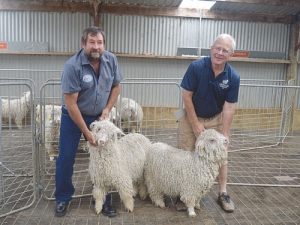Northland goat farmer David Brown is expanding his business.
Brown breeds 400 Angora goats on his 60ha farm Tahamoana at Waipu for mohair; the long, silky hair of the Angora goat is one of the most versatile textile fibres. It has several unique properties not found in any other animal fibre: lighter and less shrink resistant than wool, and stronger.
Brown hosted a field day on his farm last week as part of the Federated Farmers mohair conference.
One of the world's best known mohair experts, Gerard Thomas (GT) Ferreira was on hand to talk about animal management, fleece selection and insights on how to breed better Angoras.
Brown told farmers that he plans rear up to 1000 Angora goats on his other farm in Wairarapa. He says the mohair industry is changing dramatically, with greater demand for the fibre.
Brown re-entered the goat industry seven years ago, buying goats from around the country. But he soon realised that the mohair industry had changed.
"I realised the genetics I had were good but not the package I needed to get me where the industry was going. So a couple of years ago I went to Australia and brought back some better breeding bucks, the best I could get."
He is now using the Waipu operation as a breeding unit for a larger operation in Wairarapa; over the last two years 150 does were bred on the farm resulting in over 100% kidding.
"I am preparing these goats to become a breeding unit for what will become a larger operation in lower North Island," he says.
"It will be mainly a sheep farm but goats will be doing an ancillary job on certain parts of the property."
Brown may also get an opportunity to grow his goat farming operation in Waipu. Half of his Waipu farm is leased to a dairy farmer for maize growing and raising replacement stock.
"With dairy prices down and dairy support becoming less popular the land could be returned to me. So, I'm gearing myself into possibly extending out onto the flats I have here; I can easily keep 500-1000 goats here with cattle as a top-up to keep pasture clean."
Brown says G.T. Ferreira spent a day on his farm prior to the field day, offering him great advice on mohair.
Ferreira told mohair farmers to strive for top quality fibre.
He says farmers should not think about the kilos of mohair they can produce, but rather about producing top quality mohair.
"For that you must have very good goats that are well selected and have the right genetic base and workability traits in their fibre," he says.
The facts
◦ Mohair has properties not found in any other animal fibre:
◦ Warmth without weight: mohair is a natural insulator; it doesn't conduct heat and so keeps the wearer warm even when wet. It's also lightweight.
◦ Durability: mohair is the most durable animal fibre, so its fabric will last for years
◦ Lustre: mohair dyes well, and fabrics resist fading over time or because of hard wear
◦ Shrink resistance: because the fibres do not felt, mohair fabrics shrink less than wool
◦ Non-flammability: mohair will not burn unless it is exposed to a direct flame, and it won't melt like a synthetic fabric.










